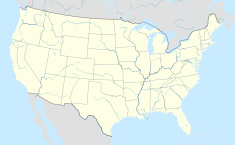Literary Hall | |
 Literary Hall, viewed from the south, facing West Main Street in Romney | |
| Location | West Main & North High Streets Romney, West Virginia, United States |
|---|---|
| Coordinates | 39°20′32″N 78°45′24″W / 39.342249°N 78.756591°W[2] |
| Area | Less than 1 acre (0.40 ha) |
| Built | 1869–70 |
| Architectural style | Federal, Greek Revival, Victorian |
| NRHP reference No. | 79002577[1] |
| Designated | May 29, 1979[3] |
Literary Hall is a mid-19th-century brick library, building and museum located in Romney, a city in the U.S. state of West Virginia. It is located at the intersection of North High Street (West Virginia Route 28) and West Main Street (U.S. Route 50). Literary Hall was constructed between 1869 and 1870 by the Romney Literary Society.
Founded in 1819, the Romney Literary Society was the first literary organization of its kind in the present-day state of West Virginia, and one of the first in the United States. In 1846, the society constructed a building which housed the Romney Classical Institute and its library. The Romney Literary Society and the Romney Classical Institute both flourished and continued to grow in importance and influence until the onset of the American Civil War in 1861.
During the war, the contents of the society's library were plundered by Union Army forces, and many of its 3,000 volumes were either scattered or destroyed. After a reorganization in 1869, the society commenced construction of the present Literary Hall in downtown Romney. It transferred ownership of its Romney Classical Institute campus to the West Virginia Schools for the Deaf and Blind in 1870 and in that year completed Literary Hall, where the society reconstituted its library collection and revived its literary activities.
The Romney Literary Society's last meeting was held at Literary Hall in 1886. From that point to 1973 the building was used as a meeting space by the Clinton Lodge of Ancient Free and Accepted Masons and the Order of the Eastern Star. In 1973, the building was purchased by prominent Romney lawyer Ralph Haines, who used it as a law office and museum. From 1937 to the early 1940s the building also housed a community library. Literary Hall was listed on the National Register of Historic Places on May 29, 1979.
- ^ "National Register Information System – Literary Hall (#79002577)". National Register of Historic Places. National Park Service. November 2, 2013. Retrieved August 28, 2017.
- ^ "Literary Hall". Geographic Names Information System. United States Geological Survey, United States Department of the Interior. December 6, 1996. Retrieved August 28, 2017.
- ^ "Hampshire County National Register of Historic Places". West Virginia Division of Culture and History website. West Virginia Division of Culture and History. Archived from the original on March 28, 2016. Retrieved March 28, 2016.



